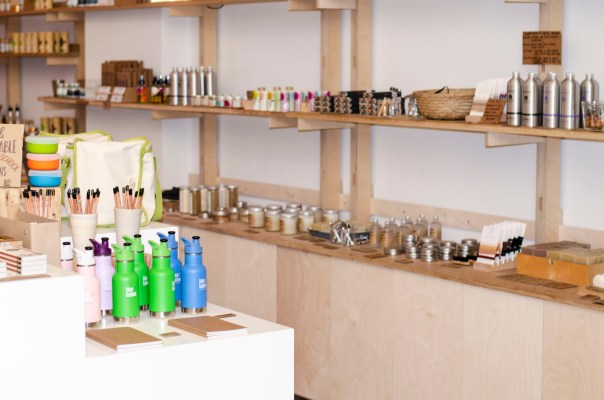Package Free picks up $4.5 million to scale sustainable CPG products - 5 minutes read
 Package Free picks up $4.5 million to scale sustainable CPG products – TechCrunch
Package Free picks up $4.5 million to scale sustainable CPG products – TechCrunchThe climate crisis continues to be just that… a crisis. And it’s spurring people across the country (and globe) to take action, particularly when it comes to their own lifestyle.
Lauren Singer is one such person. After studying Environmental Science and Politics at NYU, she started a blog called Trash Is For Tossers to make a zero-waste lifestyle more accessible and comprehensible to everyone. But there’s still an issue. Even with a steep rise in sustainable CPG products, these brands rarely have the scale to compete with traditional CPG products in price, and lack the distribution to be accessible to everyone.
That’s where the Package Free comes into play. Today, Package Free is announcing that it has raised its very first capital since launch in 2017, with a fresh $4.5 million in seed funding led by Primary Ventures. Scooter Braun’s TQ Ventures, Day One Ventures, Ryan Engel of Peleton, Brooke Wall of The Wall Group, and Casper founder Neil Parikh also participated in the round, alongside others.
Package Free started as a little pop-up shop for sustainable CPG brands to show off their wares in a brick-and-mortar environment. The brands themselves paid between $1000 and $3000 to participate, and were given 100 percent of the profit from the pop-up.
By the end of month one, says Singer, every brand had been paid back for their investment. By the end of month three, Package Free had become the primary revenue driver for those brands. At that point, they switched over to a traditional retail model to generate revenue to launch an ecommerce site.
Today, Package Free is a full-fledged reseller. The pop-up shop now has a permanent status in the trendy neighborhood of Williamsburg in Brooklyn, NY, with its own warehouse in Greenpoint. The company buys their inventory wholesale and enforces incredibly strict guidelines for the vendors they work with, not least of which is a no-exceptions no-plastic policy.
Brands that sell through Package Free not only have to use all natural ingredients and be plastic-free, but must also ship to the Package Free warehouse without using any plastic. The company actually charges vendors a percentage of the shipment if the shipment arrives with plastic, and increases that percentage on the second infraction. Three strikes, and that vendor is out for good.
“We know it’s completely possible to do these things without plastic, it’s just not the norm now,” said Singer. “So we’re trying to change the foundational benchmarks of what it means to package sustainably. I truly believe that the burden of waste should never fall on the consumer. It should fall on the manufacturer first, and then the reseller.”
Once products are at the warehouse, Package Free reuses the dunnage (packaging materials) that the original shipment came with, meaning the company never uses ‘virgin dunnage’. The boxes that Package Free ships to consumers are 100 percent recycled, and shipping labels are also 100 percent recyclable. In fact, every Package Free box is printed with the words “I’m not trash” with further facts about trash.
With the funding, Package Free wants to expand to creating its own sustainable CPG products, first tackling the ‘white space’ of products that aren’t currently available via vendor partners. Singer declined to share any more details around what Package Free’s first products might be.
Package Free is also looking to hire, with a specific focus on the marketing vertical as the company has yet to do any formal marketing or paid marketing up until this point.
The ultimate goal is to put sustainable CPG on the same playing field as traditional CPG products simply by way of economies of scale. Price is the primary obstacle between everyday consumers and accessible sustainable products, and Singer’s goal is to scale up the sustainable CPG category as a whole to the point where it can reasonably compete with the Unilevers and P&Gs of the world.
Source: TechCrunch
Powered by NewsAPI.org
Keywords:
Sustainability • Fast-moving consumer goods • TechCrunch • Global warming • Lifestyle (sociology) • Environmental science • Politics • New York University • Blog • The Tossers • Zero waste • Sustainability • Fast-moving consumer goods • Product (business) • Brand • Economies of scale • Fast-moving consumer goods • Product (business) • Price • Distribution (business) • Packaging and labeling • Scooter Braun • TQ postcode area • Peloton • Casper the Friendly Ghost • Pop-up retail • Fast-moving consumer goods • Brick and mortar • Akai S3000XL • Brand • Revenue • Brand • Retail • Revenue • E-commerce • Pop-up retail • Williamsburg, Brooklyn • Brooklyn • Warehouse • Greenpoint, Brooklyn • Wholesaling • Plastic • Packaging and labeling • Plastic • Packaging and labeling • Norm (social) • Consumer • Manufacturing • Reseller • Product (business) • Warehouse • Packaging and labeling • Dunnage • Packaging and labeling • Freight transport • Company • Dunnage • Box • Packaging and labeling • Ship • Consumer • Recycling • Freight transport • Label • Recycling • Packaging and labeling • Free box • Waste • Sustainability • Fast-moving consumer goods • Product (business) • Whitespace character • Product (business) • Product (business) • Marketing • Marketing • Marketing • Sustainability • Fast-moving consumer goods • Fast-moving consumer goods • Economies of scale • Fast-moving consumer goods •